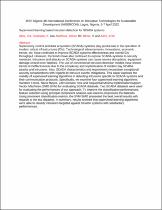JavaScript is disabled for your browser. Some features of this site may not work without it.
- ResearchSpace
- →
- Research Publications/Outputs
- →
- Journal Articles
- →
- View Item
| dc.contributor.author |
Alimi, OA

|
|
| dc.contributor.author |
Ouahada, K

|
|
| dc.contributor.author |
Abu-Mahfouz, Adnan MI

|
|
| dc.contributor.author |
Rimer, S

|
|
| dc.contributor.author |
Alimi, KOA

|
|
| dc.date.accessioned | 2022-11-07T05:11:12Z | |
| dc.date.available | 2022-11-07T05:11:12Z | |
| dc.date.issued | 2022-04 | |
| dc.identifier.citation | Alimi, O., Ouahada, K., Abu Mahfouz, A.M., Rimer, S. & Alimi, K. 2022. Supervised learning based intrusion detection for SCADA systems. http://hdl.handle.net/10204/12516 . | en_ZA |
| dc.identifier.isbn | 978-1-6654-7978-3 | |
| dc.identifier.isbn | 978-1-6654-7979-0 | |
| dc.identifier.uri | DOI: 10.1109/NIGERCON54645.2022.9803101 | |
| dc.identifier.uri | http://hdl.handle.net/10204/12516 | |
| dc.description.abstract | Supervisory control and data acquisition (SCADA) systems play pivotal role in the operation of modern critical infrastructures (CIs). Technological advancements, innovations, economic trends, etc. have continued to improve SCADA systems effectiveness and overall CIs’ throughput. However, the trends have also continued to expose SCADA systems to security menaces. Intrusions and attacks on SCADA systems can cause service disruptions, equipment damage or/and even fatalities. The use of conventional intrusion detection models have shown trends of ineffectiveness due to the complexity and sophistication of modern day SCADA attacks and intrusions. Also, SCADA characteristics and requirement necessitate exceptional security considerations with regards to intrusive events’ mitigations. This paper explores the viability of supervised learning algorithms in detecting intrusions specific to SCADA systems and their communication protocols. Specifically, we examine four supervised learning algorithms: Random Forest, Naïve Bayes, J48 Decision Tree and Sequential Minimal OptimizationSupport Vector Machines (SMO-SVM) for evaluating SCADA datasets. Two SCADA datasets were used for evaluating the performances of our approach. To improve the classification performances, feature selection using principal component analysis was used to preprocess the datasets. Using prominent classification metrics, the SVM-SMO presented the best overall results with regards to the two datasets. In summary, results showed that supervised learning algorithms were able to classify intrusions targeted against SCADA systems with satisfactory performances. | en_US |
| dc.format | Abstract | en_US |
| dc.language.iso | en | en_US |
| dc.relation.uri | https://ieeexplore.ieee.org/document/9803101 | en_US |
| dc.source | IEEE Nigeria 4th International Conference on Disruptive Technologies for Sustainable Development (NIGERCON), Lagos, Nigeria, 5-7 April 2022 | en_US |
| dc.subject | Critical infrastructures | en_US |
| dc.subject | Naïve bayes | en_US |
| dc.subject | Random forest | en_US |
| dc.subject | Supervisory Control and Data Acquisition •SCADA •Supervised learning | en_US |
| dc.subject | SCADA | en_US |
| dc.subject | Support vector machine | en_US |
| dc.title | Supervised learning based intrusion detection for SCADA systems | en_US |
| dc.type | Conference Presentation | en_US |
| dc.description.pages | 5 | en_US |
| dc.description.note | ©2022 IEEE. Due to copyright restrictions, the attached PDF file only contains the abstract of the full text item. For access to the full text item, please consult the publisher's website: https://ieeexplore.ieee.org/document/9803101 | en_US |
| dc.description.cluster | Next Generation Enterprises & Institutions | en_US |
| dc.description.impactarea | EDT4IR Management | en_US |
| dc.identifier.apacitation | Alimi, O., Ouahada, K., Abu Mahfouz, A. M., Rimer, S., & Alimi, K. (2022). Supervised learning based intrusion detection for SCADA systems. http://hdl.handle.net/10204/12516 | en_ZA |
| dc.identifier.chicagocitation | Alimi, OA, K Ouahada, Adnan MI Abu Mahfouz, S Rimer, and KOA Alimi. "Supervised learning based intrusion detection for SCADA systems." <i>IEEE Nigeria 4th International Conference on Disruptive Technologies for Sustainable Development (NIGERCON), Lagos, Nigeria, 5-7 April 2022</i> (2022): http://hdl.handle.net/10204/12516 | en_ZA |
| dc.identifier.vancouvercitation | Alimi O, Ouahada K, Abu Mahfouz AM, Rimer S, Alimi K, Supervised learning based intrusion detection for SCADA systems; 2022. http://hdl.handle.net/10204/12516 . | en_ZA |
| dc.identifier.ris | TY - Conference Presentation AU - Alimi, OA AU - Ouahada, K AU - Abu Mahfouz, Adnan MI AU - Rimer, S AU - Alimi, KOA AB - Supervisory control and data acquisition (SCADA) systems play pivotal role in the operation of modern critical infrastructures (CIs). Technological advancements, innovations, economic trends, etc. have continued to improve SCADA systems effectiveness and overall CIs’ throughput. However, the trends have also continued to expose SCADA systems to security menaces. Intrusions and attacks on SCADA systems can cause service disruptions, equipment damage or/and even fatalities. The use of conventional intrusion detection models have shown trends of ineffectiveness due to the complexity and sophistication of modern day SCADA attacks and intrusions. Also, SCADA characteristics and requirement necessitate exceptional security considerations with regards to intrusive events’ mitigations. This paper explores the viability of supervised learning algorithms in detecting intrusions specific to SCADA systems and their communication protocols. Specifically, we examine four supervised learning algorithms: Random Forest, Naïve Bayes, J48 Decision Tree and Sequential Minimal OptimizationSupport Vector Machines (SMO-SVM) for evaluating SCADA datasets. Two SCADA datasets were used for evaluating the performances of our approach. To improve the classification performances, feature selection using principal component analysis was used to preprocess the datasets. Using prominent classification metrics, the SVM-SMO presented the best overall results with regards to the two datasets. In summary, results showed that supervised learning algorithms were able to classify intrusions targeted against SCADA systems with satisfactory performances. DA - 2022-04 DB - ResearchSpace DP - CSIR J1 - IEEE Nigeria 4th International Conference on Disruptive Technologies for Sustainable Development (NIGERCON), Lagos, Nigeria, 5-7 April 2022 KW - Critical infrastructures KW - Naïve bayes KW - Random forest KW - Supervisory Control and Data Acquisition •SCADA •Supervised learning KW - SCADA KW - Support vector machine LK - https://researchspace.csir.co.za PY - 2022 SM - 978-1-6654-7978-3 SM - 978-1-6654-7979-0 T1 - Supervised learning based intrusion detection for SCADA systems TI - Supervised learning based intrusion detection for SCADA systems UR - http://hdl.handle.net/10204/12516 ER - | en_ZA |
| dc.identifier.worklist | 26024 | en_US |






